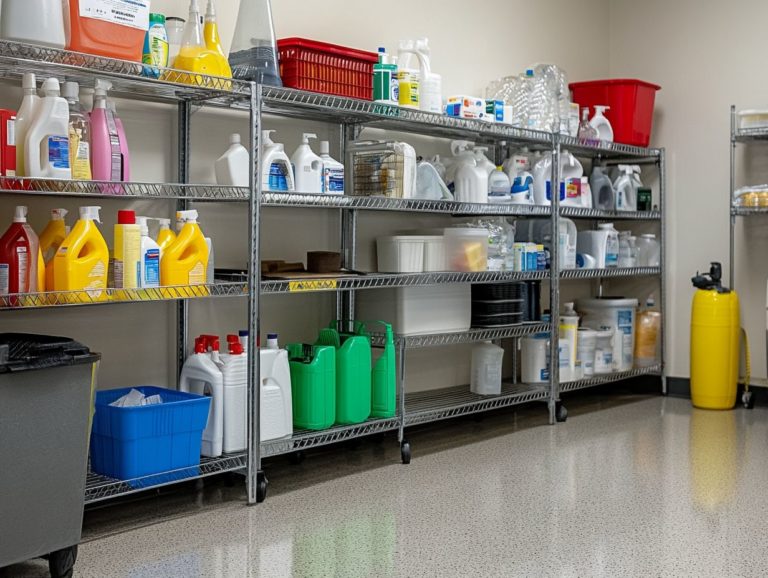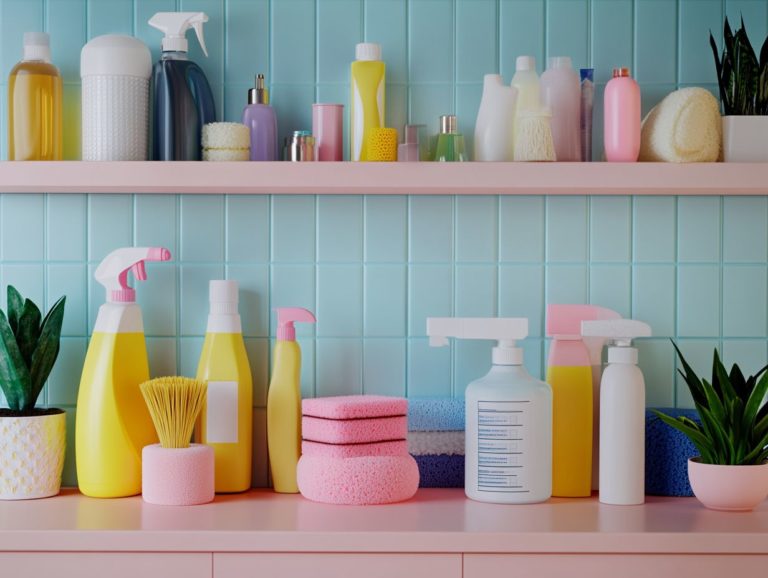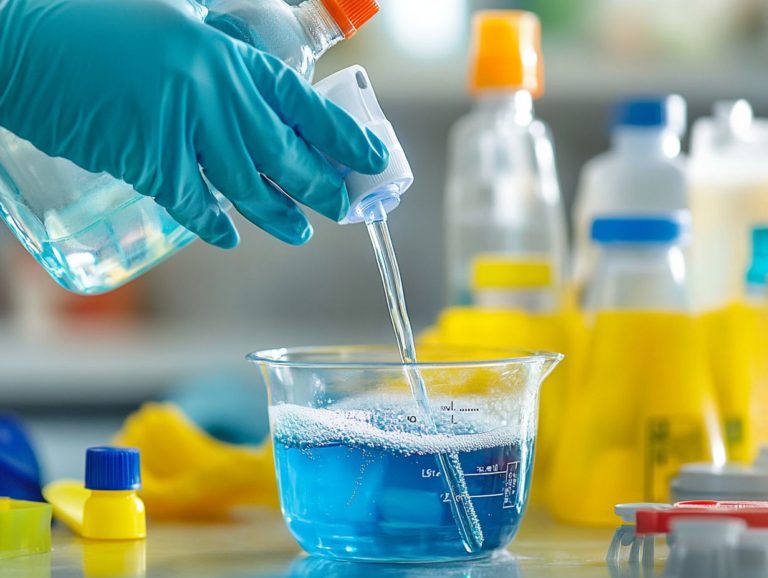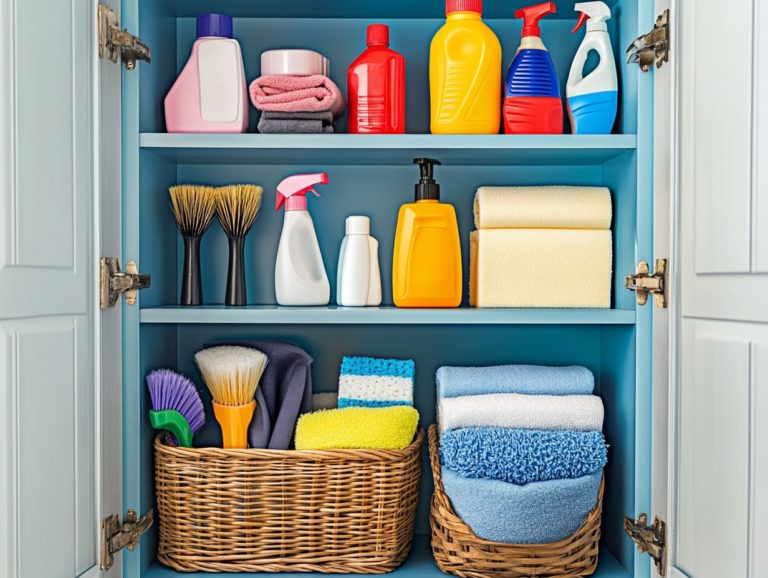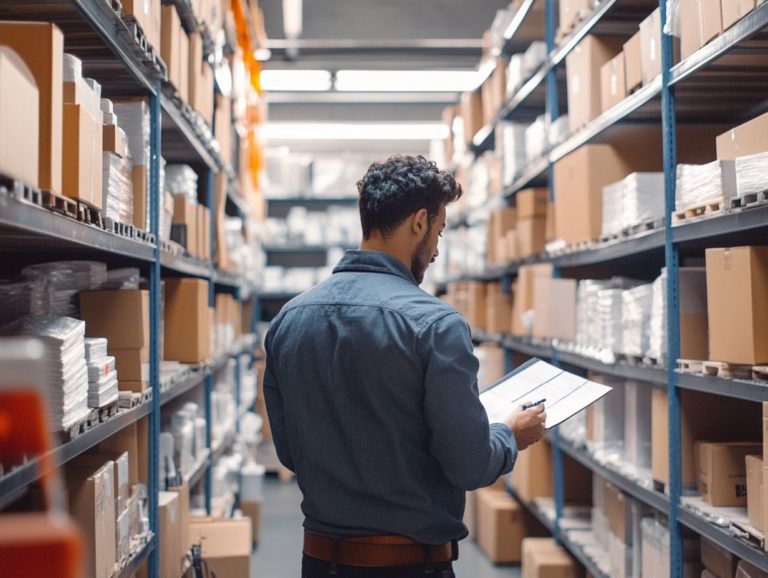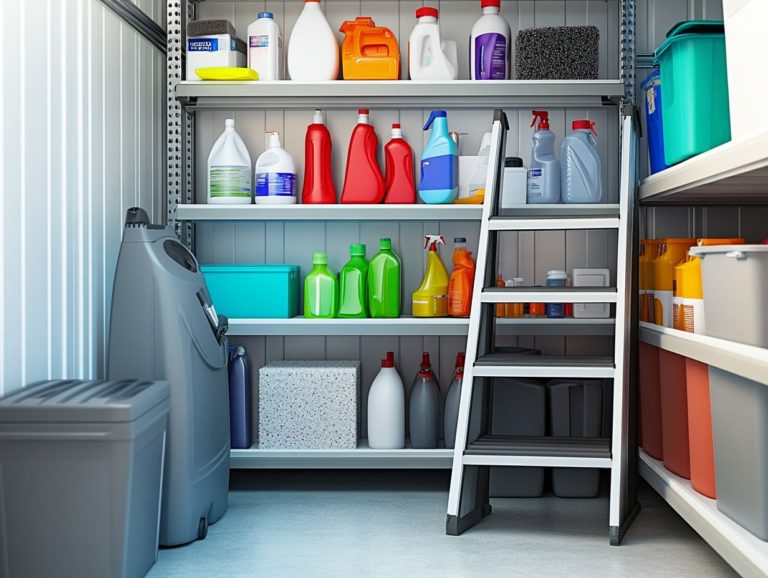The Dangers of Storing Cleaners Under the Sink
Storing cleaning supplies under the sink may seem convenient, but it can introduce significant dangers into your home, especially regarding food storage and recycling management.
The risks range from potential poisoning to dangerous chemical reactions and fire hazards. These household items can become serious threats if not stored properly. This article explores these risks associated with under-sink storage, offering safer alternatives and practical tips on how to responsibly handle your cleaners.
By learning to manage your cleaning supplies wisely, you can keep your home and loved ones safe.
Contents
- Key Takeaways:
- Why is it Dangerous to Store Cleaners Under the Sink?
- What Are the Risks of Storing Cleaners Under the Sink?
- How to Properly Store Cleaners to Avoid Dangers?
- What Are Some Alternatives to Storing Cleaners Under the Sink?
- Frequently Asked Questions
- What are the dangers of storing cleaners under the sink?
- What types of cleaners should not be stored under the sink?
- How can storing cleaners under the sink be a hazard for children?
- Can storing cleaners under the sink be a danger to pets as well?
- What is the best alternative to storing cleaners under the kitchen sink or bathroom sink?
- What other precautions should be taken when storing cleaners and other household items in the home?
Key Takeaways:
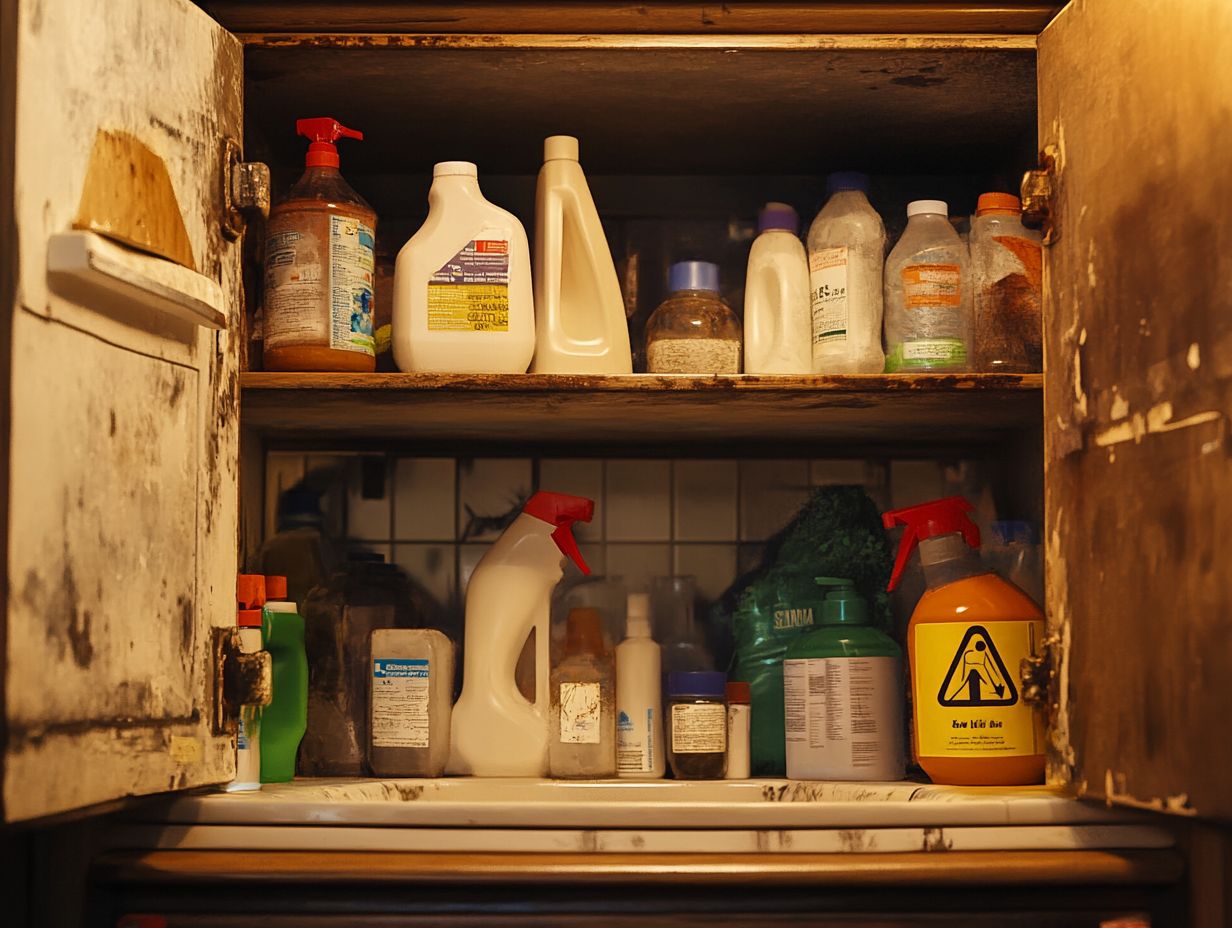
- Storing cleaners under the sink can pose serious risks such as poisoning, chemical reactions, fire hazards, and breathing in dangerous fumes.
- To avoid dangers, store cleaners out of reach of children, in a well-ventilated area, separate chemicals, keep lids closed, and use locking cabinets or safety latches. Additionally, organize items like batteries, lightbulbs, and fire extinguishers in appropriate storage.
- Alternatives to under-sink storage include using high shelves or cabinets, utilizing wall space, creating a cleaning caddy, or storing in a separate room or closet.
Why is it Dangerous to Store Cleaners Under the Sink?
Storing cleaning supplies under the sink can present significant dangers, particularly in households in Las Vegas. Unique plumbing systems might amplify issues related to moisture and chemical exposure.
It’s crucial to manage expired products and dangerous items carefully. Items like chemical cleaners, expired products, and hazardous materials can unintentionally become safety hazards, posing risks for both children and pets. Make sure to store pet food away from cleaners to avoid dangerous contamination!
Improper storage can create fire hazards, especially if flammable materials are kept near electronic devices or heat sources. For homeowners, seeking professional assistance from services such as Lange Plumbing & Fire Protection is essential for safe and effective storage solutions.
What Are the Risks of Storing Cleaners Under the Sink?
Storing cleaners under the sink carries alarming risks that deserve your attention. The concerns predominantly revolve around poisoning, chemical reactions, fire hazards, and the inhalation of harmful fumes.
It s easy to inadvertently create a hazardous environment if cleaning supplies, especially those with toxic chemicals, are not stored carefully. The risk of children or pets accessing these dangerous products significantly heightens the potential for poisoning.
Mixing different chemicals can lead to severe reactions, which could result in fires or the release of noxious fumes. This situation demands vigilance and proper storage solutions.
1. Poisoning
Poisoning is a significant concern when it comes to storing cleaning supplies like chemical cleaners under your sink. These substances can easily be ingested by curious children or pets. Even small amounts of highly concentrated cleaners can lead to serious health issues. Implementing proper safety measures is crucial to prevent access to these hazardous materials.
Household cleaning agents such as bleach, ammonia, and various multi-surface sprays are notorious for their toxicity if swallowed. Symptoms of poisoning can vary widely, ranging from mild irritation and nausea to severe outcomes like respiratory distress and organ damage, depending on the chemical involved. Experts like Lauren Wellbank and Stacey Ballis underline the importance of recognizing these symptoms early.
It s vital for you and your family to adopt stringent safety practices, such as securing cleaning supplies in cabinets with child-proof locks, to mitigate the risk of accidental ingestion. Lange Plumbing plays an essential role in ensuring safe storage solutions by providing guidance on the appropriate installation of such safety measures. This helps create a household environment that is not only clean but also safe for your children and pets.
2. Chemical Reactions
Chemical reactions can occur when you store incompatible cleaning supplies together, creating potentially dangerous situations that could lead to toxic fumes or even fire hazards.
For instance, when bleach and ammonia common household cleaning agents are mixed, they generate harmful gases. This scenario underscores the importance of properly organizing and separating hazardous materials.
Beyond bleach and ammonia, there are other risky combinations to be mindful of, such as mixing vinegar with hydrogen peroxide. This pairing creates peracetic acid, a corrosive substance that can seriously harm your lungs.
Act now to prevent harmful reactions. Experts from Lange Plumbing recommend clearly labeling all cleaning supplies and storing them in designated, well-ventilated areas, keeping them safely apart. They emphasize the importance of retaining chemicals in their original containers to avoid mix-ups. Statistics indicate that following these safety practices can reduce the risk of chemical incidents by up to 30%, making safe storage not only prudent but essential for maintaining a healthy home environment.
3. Fire Hazard
Fire hazards increase significantly when cleaning supplies are stored improperly. If moisture builds up in spaces like under the sink, it creates a welcoming environment for flammable materials. For instance, rags soaked in chemical cleaners or other volatile substances can ignite if not managed correctly, leading to catastrophic consequences.
To mitigate these risks, it s essential to adopt safe storage practices, such as using airtight containers for your cleaning agents and promptly cleaning up any spills. Experts suggest designating specific areas for storing hazardous materials, ideally in a well-ventilated space.
For households, enlisting the expertise of plumbing services like Lange Plumbing can be crucial. They assess and improve ventilation in storage areas and address moisture issues. Adequate airflow reduces the chances of harmful vapors accumulating and minimizes the risk of moisture interacting with flammable substances, significantly enhancing your overall safety.
4. Inhalation of Fumes
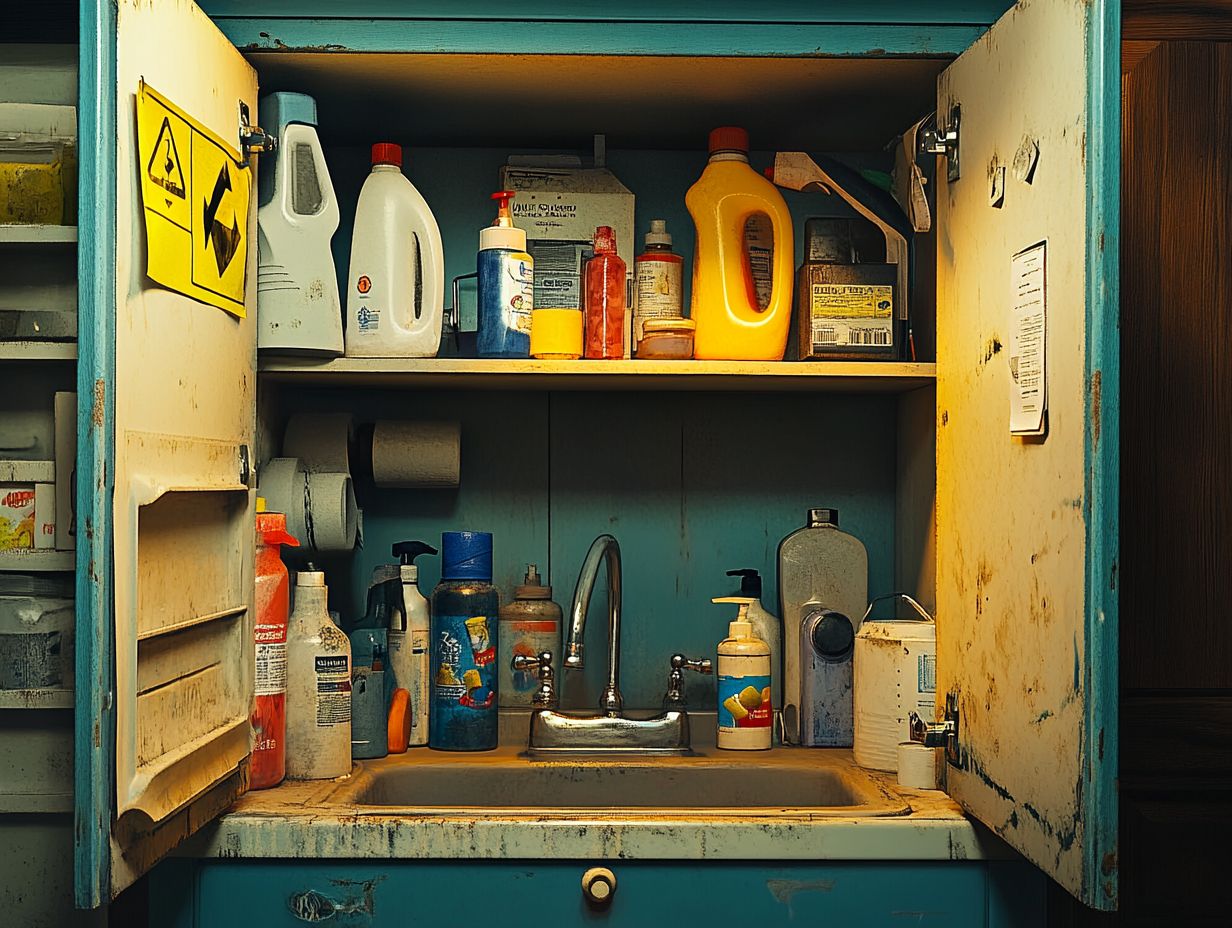
Inhaling fumes from cleaning supplies can lead to serious respiratory issues, particularly when these products are tucked away in poorly ventilated spaces like under your sink. Many common household cleaners release harmful chemicals that can evaporate into the air, which can build up in enclosed areas and pose significant health risks.
The health implications you might face range from short-term annoyances like headaches and dizziness to more daunting long-term conditions such as asthma or chronic obstructive pulmonary disease. To mitigate these risks, ensure proper ventilation when using cleaning products. This means opening windows, using exhaust fans, and allowing fresh air to circulate throughout your home. Notably, renowned experts like Martha Stewart and Jennifer Rodriguez emphasize the importance of a well-ventilated home environment.
Consider alternative options like vinegar, baking soda, or eco-friendly commercial products, as they can dramatically reduce your exposure to harmful fumes. Safety experts strongly recommend choosing these safer alternatives and seeking the advice of professionals, like Lange Plumbing, who can guide you on best practices for maintaining a clean living space while prioritizing your health.
How to Properly Store Cleaners to Avoid Dangers?
To steer clear of the hazards linked to storing cleaners under the sink, it is essential to adopt proper storage practices that emphasize safety and accessibility.
As a homeowner in Las Vegas, take proactive measures to ensure that your cleaning supplies, especially chemical cleaners, are stored in a way that minimizes risks to children, pets, and your home environment.
Creating designated areas for hazardous materials and ensuring they are kept out of reach is crucial for maintaining a safe and secure household.
1. Keep Out of Reach of Children
Keeping cleaning supplies out of children’s reach is crucial for preventing accidental poisoning or exposure to hazardous materials. Elevating and securing cabinets or shelves can effectively safeguard young ones from accessing those dangerous chemical cleaners.
Installing high cabinets is an excellent strategy. Choose those with locks or child-proof latches to ensure even the most curious toddlers can t access them. According to the American Association of Poison Control Centers, household cleaning products are responsible for thousands of emergency calls each year, particularly due to accidental poisonings in children under six. In fact, around 93% of poisonings in this age group happen right at home.
By implementing a safe storage solution for these supplies, you can significantly reduce the risk of dangerous exposure, allowing you to enjoy peace of mind while maintaining a clean and safe living environment.
2. Store in a Well-Ventilated Area
Now is the time to ensure your storage area breathes easily! Storing your cleaning supplies in a well-ventilated area is essential for minimizing the risks linked to inhaling fumes and preventing accidental reactions between chemicals. By ensuring that air circulation is adequate, you can significantly reduce the concentration of harmful vapors and enhance your overall safety.
Proper ventilation is key for a healthy environment. It also prevents chemical interactions that could lead to dangerous situations. Experts, including professionals from Lange Plumbing & Fire Protection, underscore the importance of adequate airflow in dispersing potentially harmful vapors, thereby lowering your exposure levels. Ensuring good ventilation is particularly crucial in places like Las Vegas where moisture and fire hazards can be significant concerns.
To optimize ventilation in your storage areas, consider these suggestions:
- Install exhaust fans
- Utilize open windows
- Ensure shelves are spaced adequately apart to avoid obstructing airflow
Don t forget to check for blockages and keep those air ducts clean! Regular maintenance creates a safer space for storing these necessary yet hazardous materials. Organize your storage by separating expired products from active ones to maintain a safer environment.
3. Separate Chemicals and Keep Lids Closed
Separating different types of chemicals and ensuring that lids are always tightly closed is essential for preventing unintended chemical reactions and maintaining safety in your storage areas. By grouping products by their chemical types, you can significantly reduce the risk of hazardous interactions.
It’s vital to categorize products such as acids, bases, solvents, and substances that can cause fires, placing them in clearly marked containers to avoid any potential mishaps. Regularly checking product labels not only ensures that you’re adhering to safety data but also helps you understand the specific handling instructions for each material. This is especially important for chemical cleaners which can be hazardous if misused.
Implementing color-coded labels or using designated shelving can greatly enhance both visibility and accessibility. Consider creating a master list that details each chemical’s location, intended use, and expiration dates.
This systematic approach not only promotes a safer environment but also encourages responsible management of hazardous materials, effectively minimizing the risks associated with improper storage.
4. Use Locking Cabinets or Safety Latches
Using locking cabinets or safety latches adds an essential layer of protection for your household, especially if you have children. It ensures that cleaning supplies are securely stored and out of reach of tiny, curious hands. By investing in these safety features, you can significantly reduce the risk of accidental exposure to hazardous materials.
There are various types of locking cabinets available, including key locks, combination locks, and high-tech biometric options (which use fingerprints for access), all tailored to meet different security needs. Safety latches are specifically designed to prevent unwarranted access to kitchen and bathroom cabinets. These solutions not only safeguard your children but also help you organize your spaces more effectively.
Storing electronic equipment and glass items in locked cabinets prevents accidental damages and injuries. Consider getting help from professionals, like Lange Plumbing & Fire Protection, to ensure your safety measures are top-notch! They can provide tailored advice and ensure that these safety mechanisms are installed correctly. Ensuring safety measures are in place gives you peace of mind right away!
What Are Some Alternatives to Storing Cleaners Under the Sink?
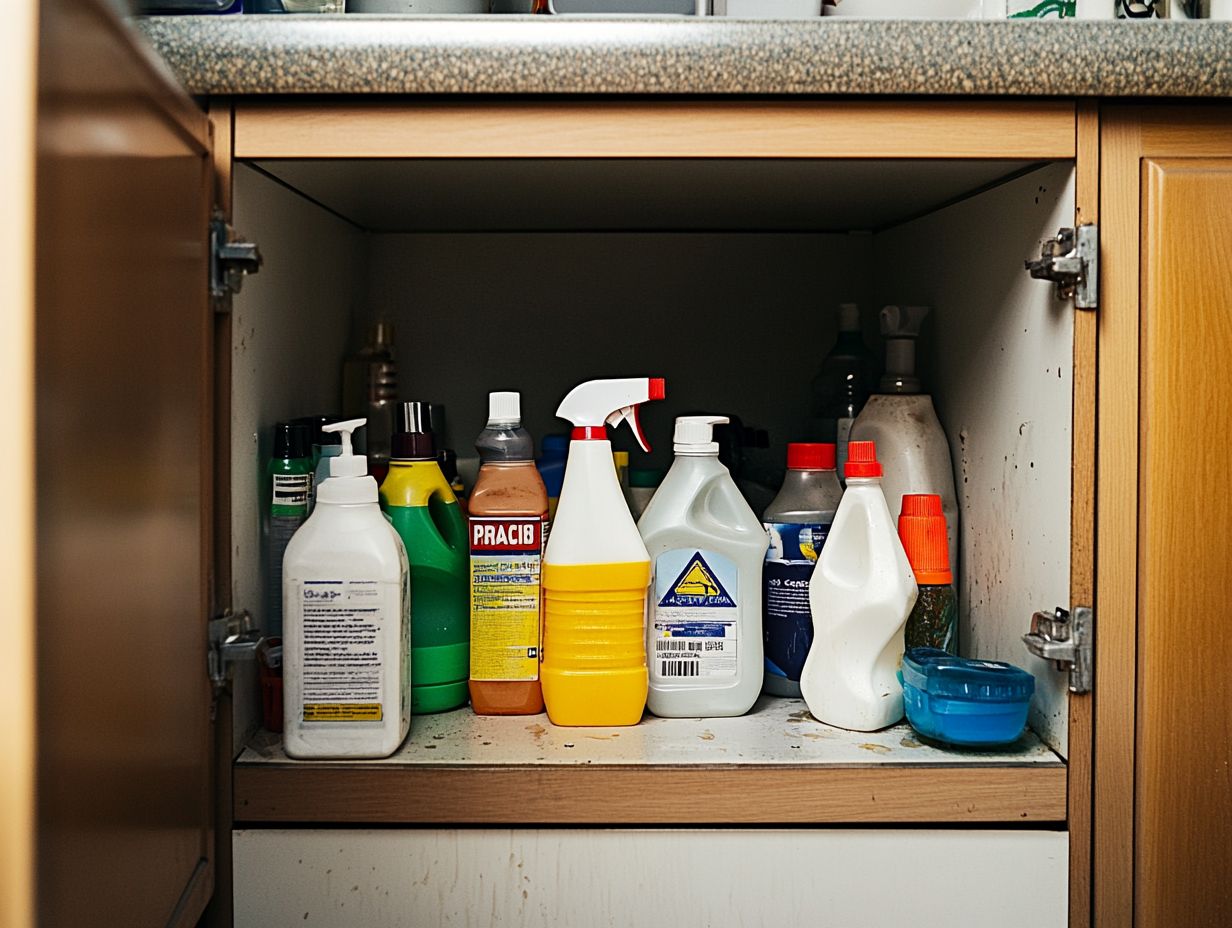
You have a wealth of alternatives for storing cleaners beyond the traditional under-the-sink approach, especially in small homes or apartments in Las Vegas, where safety and organization are paramount. Consider storing cleaning supplies in a separate room or using high shelves for better safety.
By exploring these alternative storage solutions, you can effectively safeguard your family from the hazards linked to improper cleaner storage while simultaneously optimizing your living space for maximum efficiency and elegance.
1. Use a High Shelf or Cabinet
Utilizing a high shelf or cabinet for your cleaning supplies is one of the safest alternatives to under-sink storage, as it keeps hazardous materials well out of reach of children and pets. This approach enhances safety and helps you declutter your kitchen and bathroom spaces.
Storing heavy items like cleaning products and batteries on lower shelves can prevent accidents, creating a safer environment. By placing frequently used items on lower shelves, you ensure easy access while reserving the upper areas for less-utilized supplies.
To maximize the efficiency of these elevated storage solutions, consider using sturdy step stools or ladders to safely reach those higher shelves. Incorporating clear bins or labeled containers can further promote organization, making it simple for you to find items quickly.
Additionally, securing cabinets with childproof locks or magnetic catches can provide that extra layer of safety you desire. Remember, it’s essential to store heavy items lower down to prevent accidents, creating a well-organized yet safe environment for everyone.
Take action today to implement these safety measures and ensure your family’s well-being!
2. Use Wall Space
Using wall space for storing your cleaning supplies can unlock smart storage ideas that elevate both safety and accessibility in your home. By opting for wall-mounted shelves or racks, you can free up precious cabinet space while ensuring that your supplies remain organized and secure. This is especially beneficial for storing items like cleaning products, insecticides, and fire extinguishers, which should be easily accessible during emergencies.
For example, consider incorporating sturdy wall racks that can accommodate larger items like brooms, mops, and buckets. This approach keeps them off the floor, significantly reducing tripping hazards. It also creates more space for critical items like recycling bins, making your home more organized.
Magnetic strips are great for securing smaller tools such as scissors, sponges, or even spray bottles, allowing you to access them effortlessly during cleaning sessions.
These clever products not only maximize your vertical space but also help you evade clutter. When your supplies are neatly arranged and clearly visible, you decrease the risk of accidents, enabling you to quickly locate what you need without digging through chaotic cabinets. Transform your cleaning routine today by implementing these strategies for a more efficient and safer cleaning routine.
3. Create a Cleaning Caddy
Creating a cleaning caddy is a brilliant way to keep all your essential cleaning supplies organized and easily accessible. This portable solution allows you to transport items around your home effortlessly while minimizing clutter. Plus, it ensures that hazardous materials remain out of reach during your cleaning routines.
You ll find a variety of caddies available, ranging from sturdy buckets to lightweight trays with compartments designed to elegantly house all your necessary items. To streamline your organization, consider placing frequently used products, like all-purpose cleaners, at the top, while tucking less common items, such as specialty solutions, at the bottom.
Using clear containers or labels can elevate your organization game even further, making it a breeze to locate specific products when you need them in a hurry. Having a designated space for your cleaning materials not only boosts your efficiency but also serves as a safety measure, preventing accidental spills and keeping children and pets away from potentially dangerous substances.
4. Store in a Separate Room or Closet
Storing cleaning supplies in a dedicated room or closet is an excellent choice for enhancing safety by keeping hazardous materials far removed from your living spaces. By designating a specific area for these products, you can maintain organization and significantly reduce clutter in the spaces you frequently use.
When choosing the perfect location, think about a room or closet that isn t accessed often but remains convenient when you need those supplies. A closet adjacent to the laundry room or a utility room is ideal for this purpose.
To make the most of your space, consider utilizing shelving units or bins to categorize your products by type, such as cleaning agents, tools, and personal protective equipment (like gloves and masks). Clearly labeling each container will save you time and effort during cleaning sessions, ensuring everything is in its rightful place.
By storing cleaning supplies away from common areas, you not only enhance safety by preventing accidental exposure but also create a more tranquil living environment, free from the clutter often associated with maintenance tools.
Frequently Asked Questions
What are the dangers of storing cleaners under the sink?
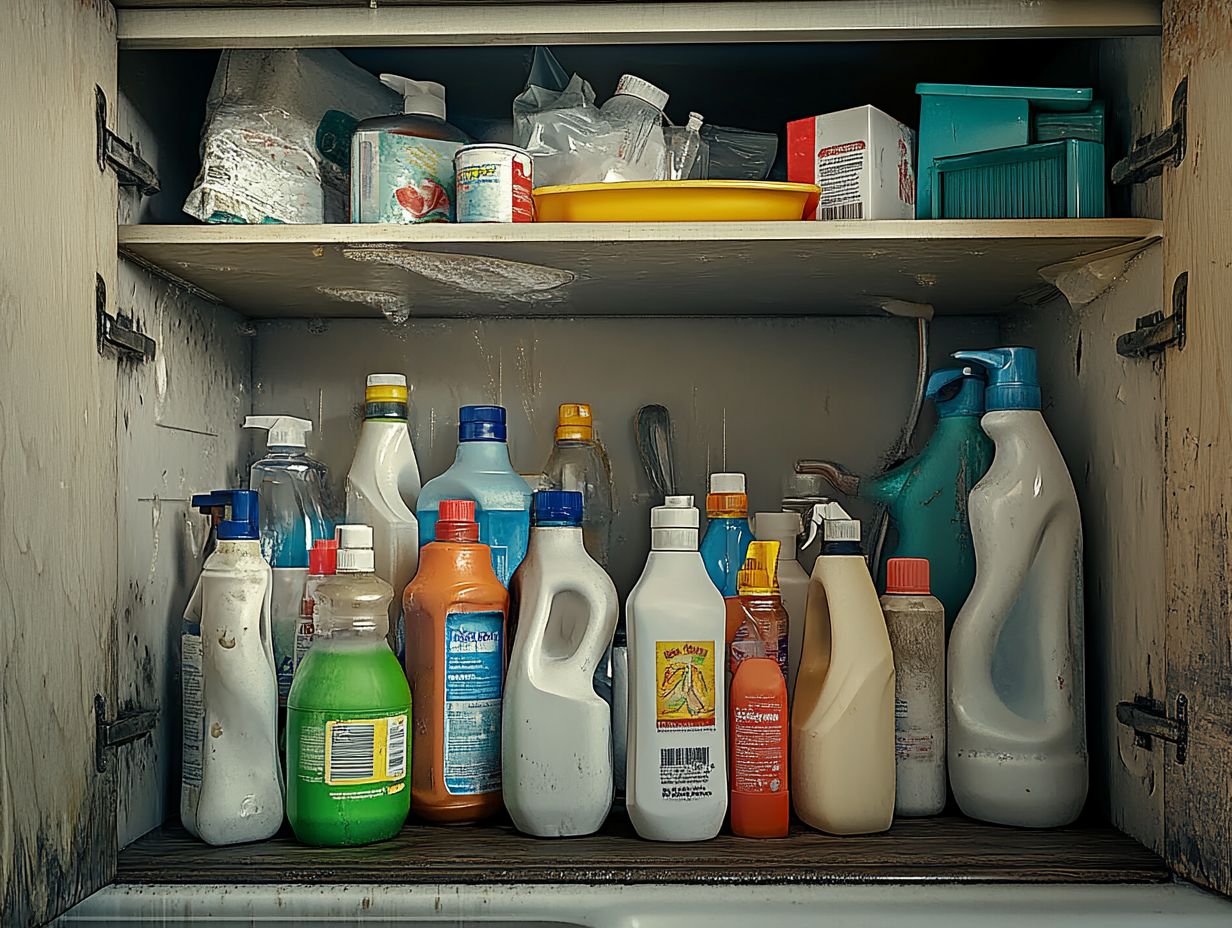
Storing cleaners under the sink can pose a serious risk to your health and safety. This area is often dark, damp, and easily accessible to children and pets, making it a potentially dangerous storage location for cleaning products.
What types of cleaners should not be stored under the sink?
Any type of cleaner that contains harsh chemicals, such as bleach, ammonia, or drain cleaners, should not be stored under the sink. These products can release toxic fumes or cause serious burns if they come into contact with skin or eyes.
How can storing cleaners under the sink be a hazard for children?
Children are naturally curious and may be tempted to explore under the sink. If they come into contact with cleaning products, they can accidentally ingest them or get them on their skin or in their eyes.
These situations can lead to serious injuries or poisoning. Therefore, it’s essential to store cleaning products and other hazardous materials in secure locations for child safety.
Can storing cleaners under the sink be a danger to pets as well?
Yes, storing cleaners under the sink can be hazardous to pets. Pets can also be curious and may try to access this area, leading to accidental ingestion or exposure to toxic substances.
What is the best alternative to storing cleaners under the kitchen sink or bathroom sink?
For your safety, store cleaners in a locked cabinet or a high spot where curious hands can’t reach them. This will help prevent any accidental exposure and keep your home safer.
What other precautions should be taken when storing cleaners and other household items in the home?
It is important to always properly label and seal cleaning products, store them in their original containers, and keep them out of reach of children and pets. Items like batteries, insecticides, and expired products also need careful handling.
Wear gloves and protective eyewear when handling these products to avoid direct contact with skin and eyes. Seeking advice from trusted organizations like the CDC or experts can provide valuable safety tips.
Don’t wait! Secure your cleaning products and create a safe space for your loved ones today!

